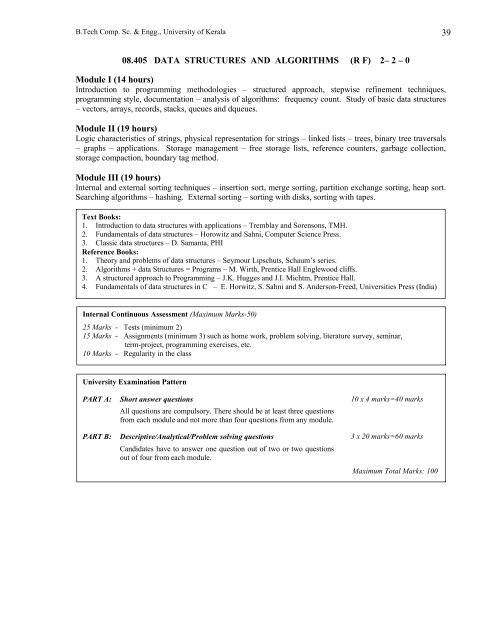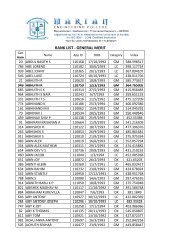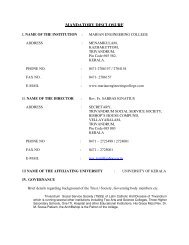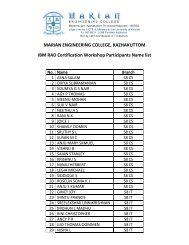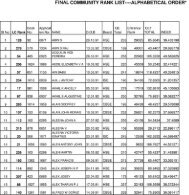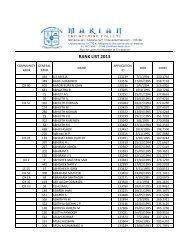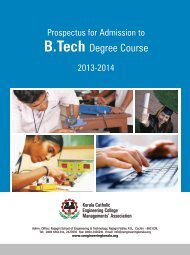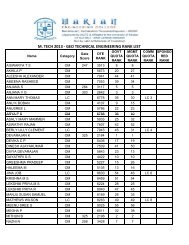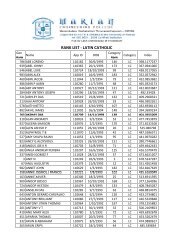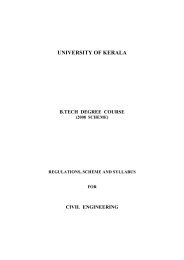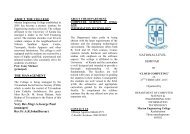UNIVERSITY OF KERALA - Marian Engineering College
UNIVERSITY OF KERALA - Marian Engineering College
UNIVERSITY OF KERALA - Marian Engineering College
You also want an ePaper? Increase the reach of your titles
YUMPU automatically turns print PDFs into web optimized ePapers that Google loves.
B.Tech Comp. Sc. & Engg., University of Kerala 39<br />
08.405 DATA STRUCTURES AND ALGORITHMS (R F) 2– 2 – 0<br />
Module I (14 hours)<br />
Introduction to programming methodologies – structured approach, stepwise refinement techniques,<br />
programming style, documentation – analysis of algorithms: frequency count. Study of basic data structures<br />
– vectors, arrays, records, stacks, queues and dqueues.<br />
Module II (19 hours)<br />
Logic characteristics of strings, physical representation for strings – linked lists – trees, binary tree traversals<br />
– graphs – applications. Storage management – free storage lists, reference counters, garbage collection,<br />
storage compaction, boundary tag method.<br />
Module III (19 hours)<br />
Internal and external sorting techniques – insertion sort, merge sorting, partition exchange sorting, heap sort.<br />
Searching algorithms – hashing. External sorting – sorting with disks, sorting with tapes.<br />
Text Books:<br />
1. Introduction to data structures with applications – Tremblay and Sorensons, TMH.<br />
2. Fundamentals of data structures – Horowitz and Sahni, Computer Science Press.<br />
3. Classic data structures – D. Samanta, PHI<br />
Reference Books:<br />
1. Theory and problems of data structures – Seymour Lipschuts, Schaum’s series.<br />
2. Algorithms + data Structures = Programs – M. Wirth, Prentice Hall Englewood cliffs.<br />
3. A structured approach to Programming – J.K. Hugges and J.I. Michtm, Prentice Hall.<br />
4. Fundamentals of data structures in C – E. Horwitz, S. Sahni and S. Anderson-Freed, Universities Press (India)<br />
Internal Continuous Assessment (Maximum Marks-50)<br />
25 Marks - Tests (minimum 2)<br />
15 Marks - Assignments (minimum 3) such as home work, problem solving, literature survey, seminar,<br />
term-project, programming exercises, etc.<br />
10 Marks - Regularity in the class<br />
University Examination Pattern<br />
PART A: Short answer questions 10 x 4 marks=40 marks<br />
All questions are compulsory. There should be at least three questions<br />
from each module and not more than four questions from any module.<br />
PART B: Descriptive/Analytical/Problem solving questions 3 x 20 marks=60 marks<br />
Candidates have to answer one question out of two or two questions<br />
out of four from each module.<br />
Maximum Total Marks: 100


